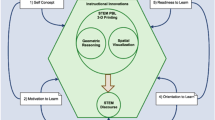Abstract
We examined the implementation of a laser-disk based science curriculum in an elementary school. The goal was to develop a richer understanding of the principles for designing a curriculum that will adequately support teachers in adopting a learner-centered framework. Issues included: who has ownership of the classroom discussion; what types of activities are engaged in terms of the constraints imposed; and what is the teacher's response to the specific tools provided (the teacher's guide, the Circle of Learning, and concept maps). In addition to looking at the implementation pattern, we also examined the impact of the implementation on student attitudes and anxiety toward science. Results indicated little adoption of the curriculum, and teachers continued to maintain a high degree of control in the classroom. However, results also indicated significant effects of the curriculum on science attitude and anxiety. Suggestions for future research are included.
Similar content being viewed by others
REFERENCES
Burton, G. M. (1979). Regardless of sex. Mathematics Teacher, 72, pp. 261–270.
Duffy, T. M., and Cunningham, D. (1997). Constructivism: Implications for the design and delivery of instruction. In D. Jonassen (Ed.), Handbook of research in educational communications and technology. Scholastic Press.
Duffy, T. M., Lowyck, J. and Jonassen, D. (Eds.) (1993). Designing Environments for Constructive Learning. Springer Verlag, Heidelberg, Germany.
Duffy, T. M., and Jonassen, D. (Eds.) (1992) Constructivism and the Technology of Instruction: A Conversation. Lawrence Erlbaum and Assoc., Hillsdale, NJ.
Emshoff, J. G., Blakely, C., Gottschalk, R., Mayer, J., Davidson, W. S., and Erickson, S. (1987). Innovation in education and criminal justice: Measuring fidelity of implementation and program effectiveness. Educational Evaluation and Policy Analysis, 9,4, pp. 300–311.
Ernest, J. (1976). Mathematics and Sex. University of California, Santa Barbara, California.
Fennema, E., and Sherman, J. (1977). Sex-related differences in mathematics achievement, spatial visualization, and affective factors. American Educational Research Journal, 14, pp. 51–71.
Herron, M. D. (1971). The nature of scientific inquiry. School Review, 79, pp. 171–212.
Hall, D. A., McCurdy, D. W., Tilgner, P., and Staley, M. (1989). Intellectual development, science anxiety, and content achievement in preservice elementary teachers. Paper presented at the Annual Meeting of the National Association for Research in Science Teaching, San Francisco, California.
Hyde, J. S., Fennema, E., Ryan, M., Frost, L. A., and Hopp, C. (1990). Gender comparisons of mathematics attitudes and affect. Psychology of Women Quarterly, 14, pp. 299–324.
Meece, J. L., Wigfield, A. and Eccles, J. S. (1990). Predictors of math anxiety and its influence on young adolescent course enrollment intentions and performance in mathematics. Journal of Educational Psychology, 82, pp. 60–70.
Niedelman, M. (1991). Problem solving and transfer. Journal of Learning Disabilities, 24,6, pp. 322–329.
Osen, L. (1974). Women in mathematics. M.I.T. Press, Cambridge Massachusetts.
Parsons, J. (1979). The effects of teachers' expectancies and attributions on student expectancies for success in mathematics. Paper presented at the annual meeting of the American Educational Research Association, San Francisco.
Pizzini, E. L., Shepardson, D. P., and Abell, S. K. (1991). The inquiry level of junior high activities: Implications to science teaching. Journal of Research in Science Teaching, 28, pp. 111–121.
Roitman, D. B., and Mayer, J. P. (1982). Fidelity and reinvention in the implementation of innovations. Paper presented at the Annual Meeting of the American Psychological Association, Washington, D. C.
Roth, W. M., and Bowen, G. M. (1994). Mathematization of experience in a grade 8 open-inquiry environment: An introduction to the representational practices of science. Journal of Research in Science Teaching, 31,3, pp. 293–318.
Schaffer, G. (1983) Special Strategies Observation System. UNC, Charlotte, Virginia.
Schon, D. A. (1987). Educating the Reflective Practitioner. Jossey-Bass, San Francisco.
Stewart, E. S. (1991). Incidence and correlates of mathematics anxiety in a sample of non-traditional-age students. (Master's thesis, University of Houston, 1990). Master's Abstracts International, 29/02A, pp. 321.
Tobias, S., and Weissbrod, C. (1980). Anxiety and mathematics: An update. Harvard Educational Review, 50, pp. 63–70.
Welch W. W., Klopfer, L. E., Aikenhead, G. S. and Robinson, J. T. (1981). The role of inquiry in science education: Analysis and recommendation. Science Education, 65, pp. 33–55.
Wigfield, A. (1988). Children's attributions for success and failure: Effects of age and attentional focus. Journal of Educational Psychology, 80, pp. 76–81.
Wilson, B. (1995). Constructivist learning environments: Case studies in instructional design. Educational Technology Publications, Englewood Cliffs, New Jersey.
Author information
Authors and Affiliations
Rights and permissions
About this article
Cite this article
Child, D.A., Duffy, T.M., Kirkley, S. et al. Issues in Adopting a Laserdisk-Based Science Curriculum. Journal of Science Education and Technology 6, 161–171 (1997). https://doi.org/10.1023/A:1022509822643
Issue Date:
DOI: https://doi.org/10.1023/A:1022509822643




